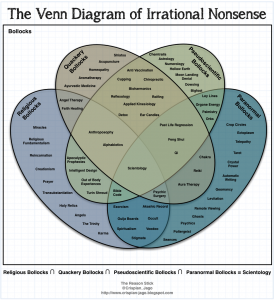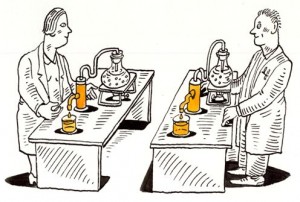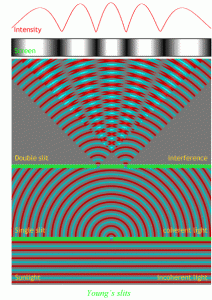Sep
04
2015
 UK’s College of Policing has released their draft Authorised Professional Practice on missing persons investigations (there is a public comment period open until October 9). This might not seem that interesting, but it is getting some attention because of their recommendations regarding the use of psychics.
UK’s College of Policing has released their draft Authorised Professional Practice on missing persons investigations (there is a public comment period open until October 9). This might not seem that interesting, but it is getting some attention because of their recommendations regarding the use of psychics.
Here is the entire section under “Psychics:”
High-profile missing person investigations nearly always attract the interest of psychics and others, such as witches and clairvoyants, stating that they possess extrasensory perception. Any information received from psychics should be evaluated in the context of the case, and should never become a distraction to the overall investigation and search strategy unless it can be verified. These contacts usually come from well-intentioned people, but the motive of the individual should always be ascertained, especially where financial gain is included. The person’s methods should be asked for, including the circumstances in which they received the information and any accredited successes.
Let’s break this down a bit: The first half is reasonable. Tips from alleged psychics cannot be ignored because people may have obtained information in some other way – from their own investigation or because they have a connection to the case – and are just claiming the information is “psychic” to obscure how they came by the information or to opportunistically exploit the case for their own reputation. Saying that such information should be viewed “in context” is therefore reasonable.
Continue Reading »
Sep
03
2015
 One burning question that comes up in skeptical circles is whether or not people who believe in the paranormal, are highly religious, or are enamored of conspiracy theories think differently than skeptics. Obviously they have different beliefs, but the question is whether or not their brains function differently in some respects from people who are more rational and scientific.
One burning question that comes up in skeptical circles is whether or not people who believe in the paranormal, are highly religious, or are enamored of conspiracy theories think differently than skeptics. Obviously they have different beliefs, but the question is whether or not their brains function differently in some respects from people who are more rational and scientific.
It certainly seems as if this is the case, but being skeptics we understand the irony of relying on intuition to conclude that other people rely more on intuition. Fortunately we have some psychological research to shed light on this question, including a recent study I will discuss below.
First let me dispense with the obvious false dichotomy – we should not think of this question as if there are two distinct types of people. Psychological studies will often do this, but they are simply dividing a continuum down the middle, or are only considering people at either end of the spectrum.
Continue Reading »
Aug
31
2015
 A recent massive study attempting to replicate 100 published studies in psychology has been getting a lot of attention, deservedly so. Much of the coverage has been fairly good, actually – probably because the results are rather wonky. Many have been quick to point out that “science isn’t broken” while others ask, “is science broken?”
A recent massive study attempting to replicate 100 published studies in psychology has been getting a lot of attention, deservedly so. Much of the coverage has been fairly good, actually – probably because the results are rather wonky. Many have been quick to point out that “science isn’t broken” while others ask, “is science broken?”
While many, including the authors, express surprise at the results of the study, I was not surprised at all. The results support what I have been saying in this blog and at SBM for years – we need to take replication more seriously.
Here are the results of the study:
We conducted replications of 100 experimental and correlational studies published in three psychology journals using high-powered designs and original materials when available. Replication effects (Mr = .197, SD = .257) were half the magnitude of original effects (Mr = .403, SD = .188), representing a substantial decline. Ninety-seven percent of original studies had significant results (p < .05). Thirty-six percent of replications had significant results; 47% of original effect sizes were in the 95% confidence interval of the replication effect size; 39% of effects were subjectively rated to have replicated the original result; and, if no bias in original results is assumed, combining original and replication results left 68% with significant effects. Correlational tests suggest that replication success was better predicted by the strength of original evidence than by characteristics of the original and replication teams.
Continue Reading »
Dec
23
2014
 The press release of this news items proclaims: “Quantum physics just got less complicated.” I’m not sure I agree. Perhaps in the minds of physicists who actually understand quantum mechanics (as well as it currently can be understood). To the rest of us this new finding is just as strange and incomprehensible as QM itself.
The press release of this news items proclaims: “Quantum physics just got less complicated.” I’m not sure I agree. Perhaps in the minds of physicists who actually understand quantum mechanics (as well as it currently can be understood). To the rest of us this new finding is just as strange and incomprehensible as QM itself.
QM describes the universe at the atomic and subatomic levels. At that scale nature behave very differently from what we are used to at the macroscopic level, which is often referred to as the realm of classical physics. The dividing line between the quantum world and the classical world remains a matter of research and debate, but it is somewhere at the level of molecules.
There are several aspects to QM which essentially describe the results of careful experiments. We don’t currently have a proven theoretical framework to explain why the universe behaves this way – that is a breakthrough waiting to happen.
One aspect of QM is known as wave-particle duality. When particles, such as photons, shine through two narrow close slits (the famous double slit experiment) the pattern of light that hits the wall (or film or detector) behind the slits is in a light and dark banded pattern that resembles the interference pattern that results when two waves intersect. The light is clearly traveling as a wave through the two slit and those waves are interfering on the other side.
Continue Reading »
Oct
28
2014
Surveys are always problematic because they are subject to interpretation, the precise phrasing of questions, sampling bias, and perhaps hidden assumptions on the part of those taking the survey. The results of any single survey, therefore, should be taken with a grain of salt. Still, they can provide a useful snapshot (if done well) of the current culture.
Skeptics are always interested in what the general public “believes.” The term “belief” is itself problematic, and when used in a survey it is subject to interpretation by those taking the survey. I am not one of those who object to ever using the term “belief.” It is a reasonable short hand for, “I find the totality of available evidence to be compelling,” or “I accept the scientific consensus on this issue,” at least in informal writing or conversation.
In a survey, however, I would prefer any questions about what people “believe” to be replaced by, or at least supplemented by, statements about what the scientific evidence says.
In any case, we have another recent survey about what Americans believe, from Chapman University. The survey covers a lot of territory, from religious affiliation and practice, to what people fear, to what they believe about scientific and paranormal topics. You can download the entire 73-page report of the results from the link above.
Continue Reading »
Oct
24
2014
Howard Wiseman, a theoretical quantum physicist at Griffith University in Brisbane, Australia, and his colleagues have come up with an entirely new theory to explain the weird behavior of particles at the quantum level. The idea is that quantum effects result from classical universes interacting with each other.
Classical physics is essentially the physics of Newton and describes the macroscopic world. In classical physics particles have a definitive location and momentum. At the scale of fundamental particles, however, the world behaves very differently.
At this so-called quantum level, particles move in waves but then interact as particles. They have only a probabilistic location and cannot be nailed down specifically. There is a minimum amount of uncertainty when trying to measure any linked properties, such as location and momentum. Even more bizarre is quantum entanglement in which particles have linked properties, even when separated across the universe.
The bottom line is that we do not really know why the quantum world behaves as it does. We have experimental data, such as the double-slit experiments, that show consistent results. When light beams shine through two close narrow slits they interfere with each other as if they are moving like waves, even when the beams are so faint that only one photon will be passing through the silts at a time. One photon can apparently cause a wave interference with itself. But when those same photons strike a film plate or detector, they behave like a particle.
Continue Reading »
Jan
16
2014
Skeptics often confront various challenging situations. One is sophisticated spurious knowledge (or SSK – OK, I just made that up). These are elaborate systems that purport to describe some body of knowledge but which are ultimately based on nothing – they are completely disconnected from reality.
Astrology is a great example of this. There are several astrological systems that are very complex, include charts and diagrams, and follow a certain internal paradigm or logic and underlying philosophy. None of this prevents astrology from being 100% fantasy. There is no relationship between the positions of the planets and stars and the personalities or fates of humans, and no mechanism by which such a relationship might exist.
The problems with systems of SSK is that they can give the powerful illusion of real knowledge. Further, people can become highly invested (in many ways) in such systems making it difficult to abandon them. They can even become institutionalized.
Continue Reading »
Nov
14
2013
Earlier this week Massimo Pigliucci over at Rationally Speaking wrote an intriguing blog post asking whether or not there is a pseudoscience black hole – a point beyond which a pseudoscience gets sucked in and can never escape? Asked from the other direction – are there any historical examples of a pseudoscience that became legitimate, essentially turned out to be true?
I thought this was an interesting enough question to pick up the ball and explore the question further.
First, the question requires a discussion of what is pseudoscience. This is a common topic of discussion among skeptics. Any definition must contend with the demarcation problem – there is no bright line between legitimate science and pseudoscience. Rather, there is a smooth continuum, although I do think the distribution along that continuum is bimodal.
The differences between science and pseudoscience have to do with process, not subject matter. Pseudoscientists display a number of typical behaviors (I will quickly list some of them here, but I am overdo for an updated post just on this topic):
Continue Reading »
Apr
30
2013
Imagine applying for a job, a position you really want and feel is a good match for your skills, and during the interview process you are seated in front of a psychic. The psychic is wearing full regalia, with a turban, crystals, and mystical garb. They proceed to give you a psychic reading – a reading which will be used to decide whether or not you will be hired for your dream job.
You can substitute any number of techniques for the psychic reading – a tarot card reading, palm reading, astrological chart, or phrenological analysis. Would you feel comfortable with such techniques deciding your fate? Would you feel outraged?
That is exactly what is happening in many corporations today, particularly in France. The technique that is being used, however, is graphology. It is as legitimate as any cold-reading technique (that is, not at all) but retains a veneer of scientific legitimacy. Graphology, or handwriting analysis, is a psychic cold-reading dressed up for the corporate world.
Continue Reading »
Mar
04
2013
Chiropractors and naturopaths would like to be your primary care physician. They are tirelessly lobbying to expand their scope of practice, with the goal of achieving full parity with actual physicians. This would be an unmitigated disaster, for reasons I will detail below.
Oregon is setting up coordinated care organizations to help promote improved care at reduced cost. The idea sounds plausible and is a good experiment in how to reduce health care costs. The idea is to set up local groups of health practitioners who work in a coordinated way to take care of the local population, including physical and mental health, with dental health on the way. These CCOs would focus on preventive care with the goal of reducing illness and ER visits.
With any new health care initiative (including Obamacare, and this CCO initiative) so-called complementary and alternative medicine (CAM) practitioners see them as an opportunity to expand their power, reach, and scope. Unfortunately they have been largely successful – they know how to talk to both ends of the political spectrum, and the relevant science seems to get lost or distorted in all the propaganda.
Continue Reading »
 UK’s College of Policing has released their draft Authorised Professional Practice on missing persons investigations (there is a public comment period open until October 9). This might not seem that interesting, but it is getting some attention because of their recommendations regarding the use of psychics.
UK’s College of Policing has released their draft Authorised Professional Practice on missing persons investigations (there is a public comment period open until October 9). This might not seem that interesting, but it is getting some attention because of their recommendations regarding the use of psychics.








